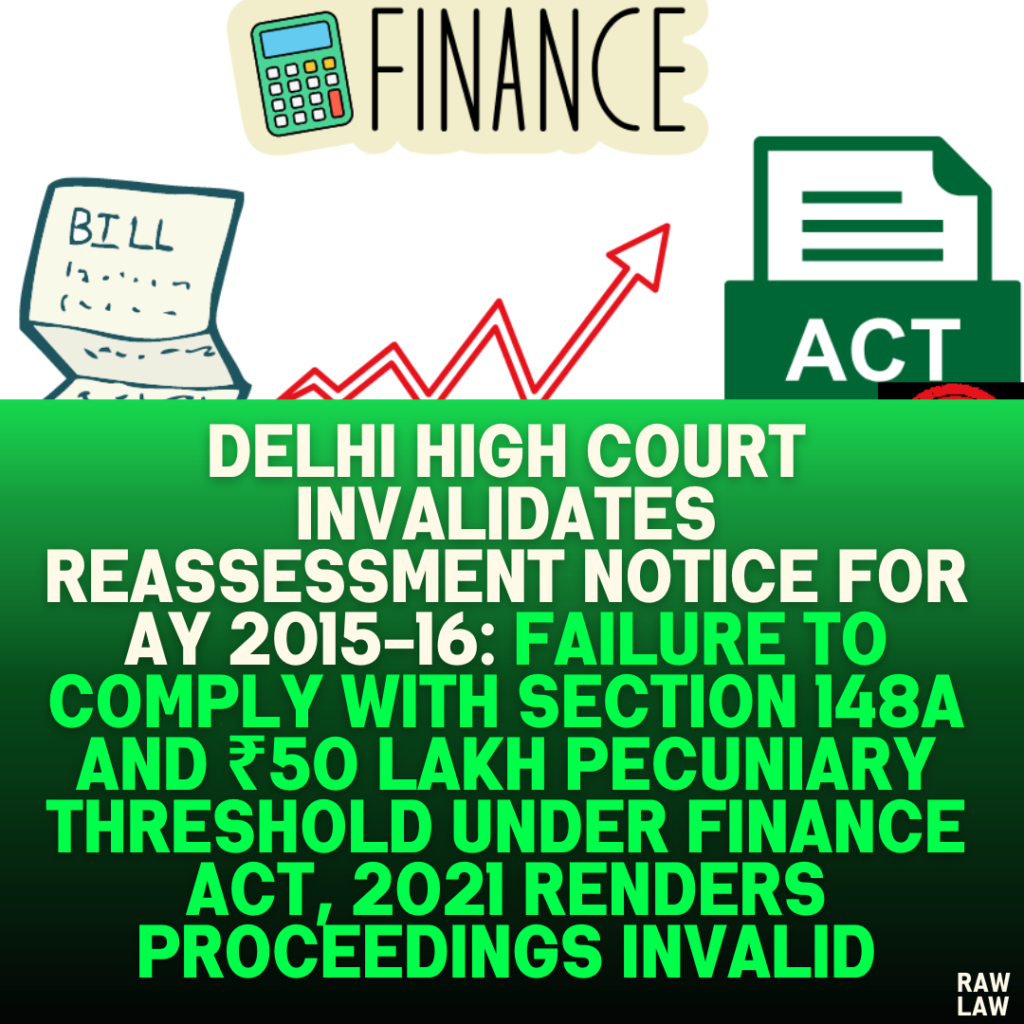Court’s Decision:
The Delhi High Court invalidated the reassessment notice and subsequent proceedings initiated under Section 148 of the Income Tax Act for AY 2015-16. The Court reasoned that:
- The reassessment notice issued on April 9, 2021, was procedurally defective as it did not comply with Section 148A, introduced by the Finance Act, 2021.
- The income allegedly escaping assessment was ₹46.17 lakhs, below the revised pecuniary threshold of ₹50 lakhs set under Section 149(1)(b) for reassessment after April 1, 2021.
This rendered the reassessment action invalid.
Facts:
- The case involved the reassessment of income for AY 2015-16.
- The notice under Section 148 was digitally signed and issued on April 9, 2021.
- The petitioner argued that the date of issuance—after March 31, 2021—meant the Finance Act, 2021’s amended provisions applied, including compliance with Section 148A.
- The reasons provided by the Revenue pegged the escaped income at ₹46.17 lakhs, below the ₹50 lakh threshold introduced by the amended Section 149(1)(b).
Issues:
- Was the notice issued on April 9, 2021, valid without adhering to the procedural safeguards under Section 148A introduced by the Finance Act, 2021?
- Did the reassessment notice fail to meet the pecuniary threshold of ₹50 lakhs, rendering it invalid under Section 149(1)(b)?
Petitioner’s Arguments:
- Procedural Non-Compliance:
- Since the notice was issued after April 1, 2021, it was mandatory for the Revenue to comply with Section 148A, which requires:
- A preliminary inquiry.
- A show-cause notice to the assessee before issuing a reassessment notice.
- The Revenue’s failure to comply with this new procedure rendered the reassessment invalid.
- Since the notice was issued after April 1, 2021, it was mandatory for the Revenue to comply with Section 148A, which requires:
- Income Below Threshold:
- The escaped income of ₹46.17 lakhs was below the ₹50 lakh threshold, making reassessment impermissible under Section 149(1)(b).
- Supreme Court Precedents:
- Cited Ashish Agarwal (2022), where the Court held that all notices issued post-April 1, 2021, under the old regime should be deemed as notices under Section 148A and follow the prescribed procedure.
Respondent’s Arguments:
- The Revenue contended that the notice was valid under the provisions of the old reassessment regime, as the digital signature was affixed post-April 1, 2021.
- The reassessment action was within the permissible timeline for reopening assessments under Section 149.
Analysis of the Law:
Section 148A: The New Procedural Regime:
- Introduced by the Finance Act, 2021, Section 148A requires:
- The Assessing Officer (AO) to conduct a preliminary inquiry.
- Issuance of a show-cause notice to the assessee.
- Consideration of objections before issuing a reassessment notice.
- The Court found the Revenue’s reassessment notice deficient, as it bypassed these procedural safeguards.
Section 149: Time and Threshold Limits:
- The amended Section 149(1)(b) applies to reassessments initiated after April 1, 2021:
- Permits reopening of assessments up to 10 years if the income escaping assessment exceeds ₹50 lakhs.
- In this case, the escaped income was ₹46.17 lakhs, falling below the threshold.
- The Court held that procedural and substantive non-compliance under Sections 148A and 149 rendered the notice invalid.
Precedent Analysis:
- Ashish Agarwal (2022):
- The Supreme Court ruled that reassessment notices issued post-April 1, 2021, under the old regime must be deemed as notices under Section 148A(b).
- The Revenue’s failure to adhere to this legal fiction in the current case invalidated the notice.
- Rajeev Bansal (2024):
- Confirmed that reassessment notices for AY 2015-16, issued post-April 1, 2021, must comply with the amended Section 149.
- Reassessment is not permitted if escaped income is below ₹50 lakhs.
Court’s Reasoning:
- Invalidity of Notice:
- The notice, dated April 9, 2021, was issued after the amendments under the Finance Act, 2021, came into effect. The Revenue failed to follow the mandatory procedure under Section 148A.
- Pecuniary Threshold:
- The escaped income (₹46.17 lakhs) did not meet the revised ₹50 lakh threshold under Section 149(1)(b), invalidating the reassessment action.
- Additions During Reassessment Irrelevant:
- The Revenue made additions of ₹49.98 lakhs under Section 69 (unexplained cash credits) and ₹3.68 lakhs from other sources, exceeding ₹50 lakhs.
- The Court clarified that these additions during reassessment cannot retrospectively validate an invalid notice based on an income of ₹46.17 lakhs.
- Judicial Fairness:
- The Supreme Court, in Ashish Agarwal, sought to strike a balance between the interests of the Revenue and the taxpayer by mandating procedural compliance under the new regime. This principle was not honored in the present case.
Conclusion:
The Delhi High Court quashed the reassessment proceedings, holding that:
- Procedural Safeguards Violated: The notice was invalid as the Revenue failed to comply with Section 148A.
- Income Below Threshold: The reassessment notice failed to meet the ₹50 lakh threshold under Section 149(1)(b).
- Additions Irrelevant: Post-notice additions exceeding ₹50 lakhs did not cure the notice’s initial defect.
Implications:
- This decision underscores the importance of adhering to procedural safeguards under Section 148A.
- The judgment serves as a warning to the Revenue to ensure compliance with amended provisions under the Finance Act, 2021.
- It highlights that reassessment actions must be based on valid jurisdictional grounds, including compliance with pecuniary thresholds.




Pingback: Bombay High Court Quashes Trial Court’s Decision Allowing Handwriting Expert Appointment: Reaffirms Res Judicata in Repeated Applications for Authenticity of Agreement to Sell - Raw Law